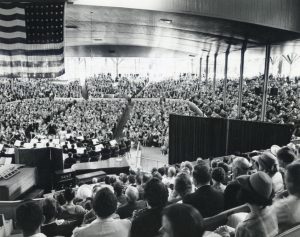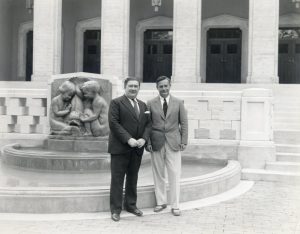
A world war, a moon landing, global shifts in power and an evolving Chautauqua: The Chautauqua Symphony Orchestra has played through it all.
The CSO celebrated its 90th year this season, making it one of the longest-running summer orchestras in the United States. What keeps the orchestra thriving into its nonagenarian years? To musicians and supporters alike, community is key.
“Only in Chautauqua”: 90 years of family
For Rick Evans, a childhood memory led to a lifelong involvement with the CSO.
“I think it probably began when I was 4 years old,” Evans said. “My mom would take me to the symphony, and I would sit in the choir loft — it was kind of my primer to great symphonic music. So it goes back 63 years, and I’ve enjoyed their performances every summer since.”
Evans did more than listen to the orchestra; he developed lifelong friendships with many of its members. He and his wife, Rainy Evans, even served as co-presidents of the CSO League, a supporting organization that encourages dialogue between the orchestra and the community it serves.
The CSO is inextricably involved with the larger Chautauqua community, Evans said. Many of the musicians return year after year, even living on the grounds and bringing their families.
“The community has always been heavily involved with the symphony,” Evans said. “When I talk to the musicians individually, there isn’t one who hasn’t shared with me just how close they feel with the Chautauqua community. It just buoys them up.”
But it’s not just about the musicians. For Evans, even the CSO’s venue of the Amphitheater makes music accessible for people of all ages.
“A grandmother can take her grandkids there and sit in a front-row seat,” Evans said. “And the kids don’t have to get dressed up in long pants or skirts, Grandma doesn’t have to drive 10 miles downtown, and when the kids get fidgety 20 minutes into the concert, Grandma can just pick them up and leave. Or she can send some of the kids home because they know their way home. Only in Chautauqua.”
Between the venue and the people, Evans said, the CSO has built something incredible.
“It feels so much more human,” Evans said. “There’s a bond between the community and the musicians.”
One such musician is Jeff Szabo, a cellist who has been with the CSO for 40 seasons — almost half of the orchestra’s existence. Szabo returns every year and even lives part-time on the grounds.
“We’ve evolved such good friendships because many of us have been here for so long,” Szabo said. “We look forward to seeing (our friends at Chautauqua) — our extended family. For a lot of people, it’s the highlight of their year to come back to Chautauqua.”

“One rehearsal, one concert”: A tradition of intensity
These relationships are vital, some musicians said. The CSO performs one of the most intense, compact seasons in the United States. Instead of the standard nine-month run, the CSO’s season is condensed to nine weeks.
For first violinist David Hult, this fast-paced season requires skill and dedication.
“All the musicians are seasoned professionals, which makes it possible to follow the schedule we do here: one rehearsal, one concert,” Hult said, explaining that many traditional orchestras only perform concerts about once per week. “Here, we do three concerts per week — each with separate programs — usually with one rehearsal each.”
Hult has been with the CSO for 41 seasons. That adds up to some serious experience — over a thousand concerts with the CSO alone.
When first violinist Lenelle Morse first joined the orchestra 27 seasons ago, a summer season’s intensity was more than just a challenge to her: It was a selling point.
“I just loved the atmosphere, the intensity of it, and the absolute love of orchestral music,” Morse said. “Many of us also were playing in seasonal orchestras, so it was helpful to have something during the summertime.”
With only one rehearsal per concert, the members need to be attuned to one another and with their instruments, Morse said. Even as an orchestra, she added, the CSO creates a musical conversation that rivals chamber music.
“The listening capabilities of this orchestra are phenomenal,” Morse said. “After one rehearsal, we can march in and play a quality concert. It’s like giant chamber music; everybody is listening and reacting.”
For five years now, Rossen Milanov has led the intense season from the conductor’s podium. Like Morse, he believes that the musicians’ skill and improvisational abilities allow the CSO to perform one-of-a-kind concerts.
“That intensity makes things fresher and less predictable,” said Milanov, the ninth music director in the CSO’s history. “It’s exciting to have an idea of the shape of the performance and then to create that musical sculpture onstage in front of everybody. If something goes wrong, we have to learn how to correct it so that it’s part of the organic whole.”
No two CSO concerts are the same in any given season; its offerings range from classical European pieces to brand-new compositions. For bassoonist Jeff Robinson, the CSO’s changing programs are part of a brave take on orchestral music.
“This is an orchestra that takes chances, and would rather have something exciting happen than something that was safe and on the dull end,” Robinson said.
“The best of music-making”: 90 more years of the CSO
Throughout its existence, the CSO has performed music from across centuries and continents. Even its first-ever conductor, Albert Stoessel, aimed to combine classical repertoire with modern music and American compositions.
While orchestral groups had done residencies at the Institution since 1903, the CSO did not formally begin until 1929. Under Stoessel’s leadership, the group found strong support among Chautauquans from the very beginning. On June 28, 1929, the Daily’s first issue of the season announced the orchestra as a continuation of musical excellence:
“Chautauqua has long been a summer center for music in America, and the program offered for the 56th Assembly will quite easily hold the high standard of past years and … bids fair to surpass in many ways the interests of former seasons,” the Daily reported. “Artists of national and international reputation and facilities of unusual excellence comprise advantages hardly to be equaled.”
The reporter’s predictions were bold, but it seems from the season’s last CSO article that the expectations were matched — and that the Chautauqua community had embraced their new program. In an August 19, 1929, Daily article titled, “FINAL CONCERT: The Symphony Orchestra ends the season with splendid concert,” the Daily summarized Chautauquans’ response to the new orchestra and its conductor:
“… Prof. Davis Edwards came forward at the close of the final Symphony Concert and read the following cablegram received from (Institution President) Dr. (Arthur) Bestor: ‘Greetings and thanks to our orchestra,’ ” the Daily reported. “Prof. Edwards then added a few words of appreciation from the Institution’s deep regard for the orchestra and its conductor, which it admires both as friends and as artists.”
At the end of the speech, “(a)s an expression of gratitude and sincere thanks,” audience members gave the “Chautauqua Salute” to Stoessel and the orchestra — hundreds of white handkerchiefs held up toward the stage.
The tradition continues: The CSO performs works from the likes of Amadeus Mozart to John Williams. Deborah Sunya Moore, vice president of performing and visual arts, said the orchestra is a longstanding pillar of Chautauqua tradition.
“The CSO is really the musical heartbeat of the entire Institution,” Moore said. “Not only does everyone still flock to the CSO concerts, but the CSO is also what makes the opera possible, what makes the Inter-Arts Collaborations possible. … What we really focus on for the 90th anniversary season is not only looking back, but looking forward.”
Moore described the various ways the CSO is moving forward: Sunday matinees to reach broader audiences, Kennedy Center Link Up programs with area students and performances of both contemporary and classical compositions.
For Morse, this evolving program can survive the test of time — especially with its tradition of community support.
“It gives me hope for another 90,” Morse said. “It’s a vital part of the community, and it’s the best of music-making, in my opinion. To keep that up is a wonderful thing.”




